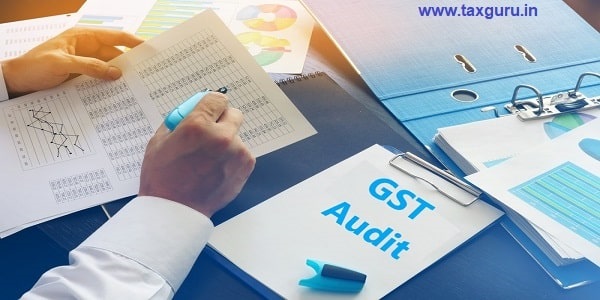GST Departmental Audit – Parameters For Selection, Documents That Can Be Asked For And Proactive Steps To Be Undertaken
GST has been one of the biggest tax reforms of our country. July 2021 marked four years of GST Implementation and though it has stabilized to a large extent, the taxpayers are still grappling with some issues and compliances required to be carried out.
In recent times, we have seen Department issuing notices for conducting audit. GST Audit involves detailed scrutiny of books of accounts, verification of documents on the basis of which the books of account are being maintained, carrying out reconciliation with the returns filed, verifying turnover, deductions and refunds being claimed, tax rates, input tax credit being availed and utilized and other relevant issues.

Selection for taxpayers to undergo GST Audit is being done based on certain risk parameters and Computer enabled techniques. Some of the risk parameters that could be considered during selection of audit are as follows –
1. Size of the Taxpayer’s turnover.
2. Change in Taxpayer’s turnover from the previous year.
3. Higher incidence of supplies without issuance of e-way.
4. High variance in ITC between 3B and 2A.
5. Taxpayers who do not file periodical returns but issues E-way bill.
6. Financial ratio analysis.
7. Size of the Taxpayer’s refund.
8. Taxpayer who has requested waivers or is bankrupt
9. Specific information received from other Government authorities like Income Tax, ROC, RBI, etc.
The department, for conducting audit, may ask for following documents and records for examination –
1. Audited financial statements including directors’ and audit report
2. Tax Audit Report
4. Form 26AS
5. Trial Balance
6. Stock Register reflecting opening balance, receipt, supply, and goods lost, stolen, destroyed, and the closing balance.
7. Tax Invoices, bills of supply, delivery challans, purchase bills, credit and debit notes, receipt and payment vouchers.
8. Production records including break up of raw materials and finished goods.
9. Details of Advances received and paid.
10. Records pertaining to Input tax credit availed and utilised.
11. Names and complete addresses of the Suppliers and Customers
12. Reconciliation statement between returns filed and books of accounts.
13. Any other relevant information as required by the law and deems fit.
As a taxpayer / Consultant, we should take care of the following things before submitting documents to the department –
Quantitative Stock statement:
Quantitative stock statement might be the first thing that department may ask for. Most of the taxpayers do not maintain quantity wise and HSN wise stock summary. Also, to adjust their profits for income tax purposes, they use stock as the tool to reduce Gross Profit. Under GST, it is mandatory to maintain quantity wise and HSN wise stock summary. So, it is advisable to prepare the stock statement beforehand and if any deviation or manipulation is found, the same should be declared to avoid any penalty which department may levy at a later stage
Preparation of Reconciliation Statement:
Although, most reconciliation statements are being prepared at the time of filing GSTR 9 and 9C, it is still advised to check and go through all the reconciliation statements before submitting it to the department. Some of which are as follows –
1. Reconciliation between taxable value and tax liability declared in GSTR 3B and GSTR 1.
2. Reconciliation between Input Tax Credit claimed in GSTR 3B and that reflected in GSTR 2A/2B
3. Reconciliation of Tax liability declared and ITC Claimed in GSTR 3B with books of accounts.
4. Reconciliation of Taxable value as per GSTR 9C/9 with that in the Trial Balance.
Detailed Scrutiny of Trial Balance:
Although, the department can rely on the balance sheet and Profit and loss statement, they might still ask for detailed Trial Balance as scrutinising it can help detect certain adjustments which might have been made in financial statements. For example: Most of the time, Freight is adjusted in the profit and loss statements which may lead to wrong calculation of GST payable under Reverse Charge Mechanism. Similarly, Discounts received and discounts allowed have separate treatment under GST but at times, they are netted off in Profit and Loss Account. Therefore, it is advised that Opening balances, transactions during the year and closing balances must be scrutinized properly in Trial Balance.
Tax paid under Reverse Charge Mechanism (RCM):
Taxpayer / Consultant must go through various heads of expenditures to assess the tax payable under RCM before filing the documents with department for audit. It should also be checked whether the same amount has been claimed as Input Tax Credit. Rate wise reconciliation of RCM payable and paid by the taxpayer should also be prepared. If any discrepancy or deficiency is being found, the same should be discharged before department initiates its proceedings.
HSN and rate of tax:
It is advisable to check whether correct HSN codes have been used by the taxpayer or not. If not, check whether there is any difference in rate of tax. If there is no difference in rate of tax, it is advisable to voluntarily disclose the use of wrong HSN Code. But if there is difference in rate of tax, the difference should be voluntarily paid to avoid penalties or if excess tax has been paid, the same should be claimed as refund.
Check whether all Compliances are done:
It is advisable to check whether there is any lapse in the compliances by the taxpayer. Check whether all the returns have been filed, whether the taxes have been paid within due date. If there is any delay, whether interest has been paid. In case any short payment is found, the same should be paid voluntarily to avoid penal consequence.
Above mentioned are some of the things which should be taken care of by the taxpayer/consultant before submitting documents to the department for Audit.




